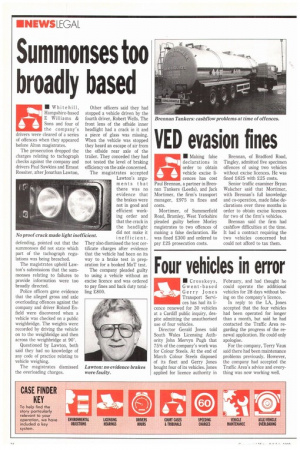Summonses too broadly based
Page 18

If you've noticed an error in this article please click here to report it so we can fix it.
• Whitehill, Hampshire-based E Williams & Sons and four of the company's drivers were cleared of a series of offences when they appeared before Alton magistrates.
The prosecution dropped the charges relating to tachograph checks against the company and drivers Paul Sawkins and Ernest Rossiter, after Jonathan Lawton, defending, pointed out that the summonses did not state which part of the tachograph regulations was being breached.
The magistrates upheld Lawton's submissions that the summonses relating to failures to provide information were too broadly directed.
Police officers gave evidence that the alleged gross and axle overloading offences against the company and driver Roland Enfield were discovered when a vehicle was checked on a public weighbridge. The weights were recorded by driving the vehicle on to the weighbridge and then across the weighbridge at 90°.
Questioned by Lawton, both said they had no knowledge of any code of practice relating to vehicle weighing.
The magistrates dismissed the overloading charges. Other officers said they had stopped a vehicle driven by the fourth driver, Robert Wells. The front lens of the offside inner headlight had a crack in it and a piece of glass was missing. When the vehicle was stopped they heard an escape of air from the offside rear axle of the trailer. They conceded they had not tested the level of braking efficiency on the axle concerned.
The magistrates accepted Lawton's arguments that there was no evidence that the brakes were not in good and efficient working order and that the crack in the headlight did not make it inefficient. They also dismissed the test certificate charges after evidence that the vehicle had been on its way to a brake test in preparation for a booked MoT test.
The company pleaded guilty to using a vehicle without an excise licence and was ordered to pay fines and back duty totalling £800. ficient.
















































































